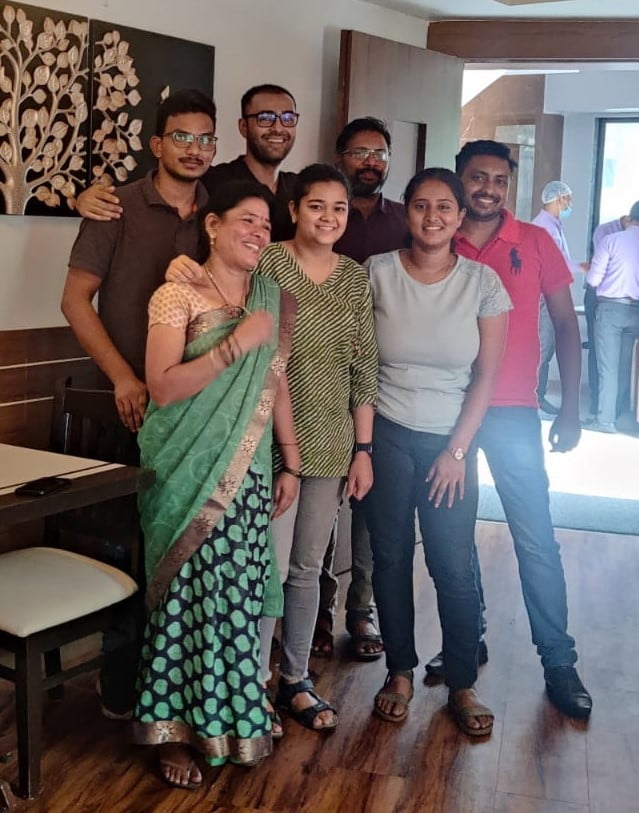Dear Friend of Ashaya,
An interesting little incident happened with Jayashri, our informal worker.
Wide-eyed and usually with a wide smile, Jayashri works part-time with us. She leads the pre-processing processes at Ashaya of washing and shredding plastic packets, and sometimes even dabbles in some of the more complex processes like filtration and extrusion.
When she first joined, and we invited her to eat lunch with us, she looked a little bewildered. No one generally asks her this. A couple of days later, she got her lunch dabba and the process of “formalization” started.
Like most informal workers, we started off paying her in cash. But we kept insisting on doing a bank transfer instead. “Sir, I don’t trust my bank. They cut money and I can’t use an ATM, so please just give me cash.”
So, we did.
But we also wanted to get to the bottom of this bank-cutting-money situation. My bank doesn’t cut money randomly from my account, so what’s happening here? We went to her bank with her to find out what the deal was.
Jayashri had no idea how much money she had in her account. Turns out she had filled out some forms during the pandemic and Rs 4,000 had arrived in her bank account. But magically, only Rs 2,800 remained. Wait, what now?
We found out that Jayashri had a “minimum-balance” account. This means that she must maintain a minimum balance of Rs 2,000 or the bank charges her a monthly fine. She (or someone) had opened the account in 2015, and probably didn’t add much money to it.
So, when the Rs 4,000 came in, Rs 1,200 was deducted as accumulated fines. Now twelve hundred rupees ($16) might not seem like a lot for you and me, but it’s significant for her.
While telling us this, the bank teller was nice enough to also tell us that we can fix this. How?
We (Ashaya) just had to give the bank an official letter (letterhead, stamp etc) that Jayashri worked with us, and they would convert her account from a “minimum-balance” account to a “salary” account which had no fine or fees for maintaining a zero balance. That’s it. One letter.
We now do bank transfers for her monthly salary.
I am starting to learn that formalization isn’t just about contracts and processes, it’s also about building trust and instilling dignity, all the while playing the long-term game of patience.
We still have a long way to go.
*****
As the weather temporarily and permanently changes, there has been a slew of illnesses flowing through our team here at Ashaya in the last few months. We have seen our new friend Covid and even our old friend Dengue, while the usual viral infections and stomach bugs have been regular visitors.
I was partially knocked out the last couple of weeks, and it was humbling. The body was weak, but it was the mind that really wobbled, amplifying worries and woes to irrational levels, leaving me to wonder how much of all this is just chemicals in our brains and bodies.
All that aside, the last three months at Ashaya have been pivotal, for all the right reasons.
While we have been making progress, we have found external validation a little harder to find.
But that changed when among all the rejections, we found out that we were one of the winners of Social Alpha’s “Techtonic Innovations in Circular Economy” competition. We had applied to this same competition last year in our infancy and hadn’t made it. So, some 365+ days later, to end up as one of the winners, was somewhat serene.
Not only are we getting a generous grant from them, but it gave us the push we somewhat secretly wanted to really go for it. The best part about it has been that Social Alpha is letting us be – they are trusting us and our plan, and dabbing us with the fuel we need to accelerate.
Thanks to that push, we are scaling up our R&D lab into a micro-pilot-plant of sorts, looking to bump up our lab recycling capacity from 20 kgs to 100 kgs of metalized multi-layered packaging (MLP) recycling a month.
That’s still not a lot, but more crucially, the reactors and the processes we are building are scalable to larger quantities. So, think of this as conquering the 10k run while building up to a marathon.
Meanwhile, our usually even-key lawyer was a little startled when we made an apparently peculiar request to him.
We asked him to amend our Memorandum of Association (MoA) to include clauses that tie us directly to being impact-first. He told me how much it would cost, and with a big gulp of air, I was like, yes, let’s do it.
And now, we are proud to say that we have added four additional clauses to our MoA that embody the impact we want to create – the UN SDG goals we are committed to around poverty alleviation, sustainable cities and responsible consumption, reinvestment of our earnings into impact and being stakeholder-centric instead of shareholder-centric (please see the postscript for the full text of the four clauses we added).
We are now legally bound to our impact.
Okay, thanks for all the gloss, Anish, but where’s your product?
I can’t wait to tell you about our product. But I’ll have to.
We know what it is, and we are pretty sure we can build it, and we are oh-so-close. We are hoping to launch it along with a tasty new brand and look in the next three months. It’s ambitious but it’s NOT revolutionary, you’re probably going to be underwhelmed, but it’ll be real progress. Progress that closes the loop and lays the final bricks of the first layer of our foundation.
Yes, it’s taking a while, and trust me, all of us here are getting antsy. But we’ve been patient so far, and all we need is a little more patience.
Until next time,
Anish
*****
P.S. Here’s the full text from our MoA amendment:
Clause III of the MOA be altered by adding the following sub-clauses numbered as (3), (4), (5) & (6) stated as follows:
- To carry on the business by revolutionizing waste management practices with the help of innovation and technology facilitating extensive social & environmental impact, while developing manufacturing processes that encourage reusing and recycling.
- To strive to achieve and contribute towards the fulfilment of the Sustainable Development Goals (also called Global Goals) set by the United Nations on January 1, 2016, with a focus on Goal # 1 (No Poverty), Goal # 11 (Sustainable Cities and Communities) and Goal # 12 (Responsible Consumption and Production).
- To retain, reinvest and plough back the earnings generated from the business periodically and proportionately by utilizing them towards serving society in solving challenges such as poverty alleviation, environmental sustainability, and the common good of the society as a social enterprise.
- To establish that we are a stakeholder-centric business (over a shareholder-centric business) in which all key stakeholders of our organization (employees, advisors, board members, suppliers, customers and other such persons involved directly) will be given due moral and ethical consideration while conducting our activities.

Team Lunch (Jayashri is the one in the saree if you’re curious)
